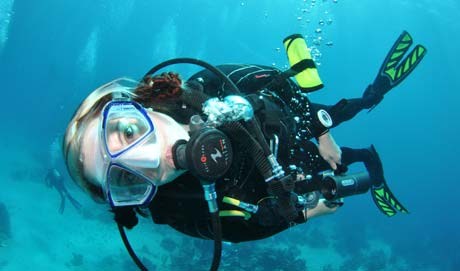
Lauren Arthur, Resident Marine Biologist at the new Dusit Thani Maldives, helps you explore the ocean without harming it
When protecting yourself against UV rays try to avoid lathering yourself, as chemicals will leak into the ocean. Instead, wear full-length suits or long board-shorts and rash vests. If you feel sunscreen is essential, use biodegradable, eco-friendly ones.
In the Maldives, we have venomous stonefish, scorpionfish and lionfish, which are often camouflaged. By keeping your hands streamlined by your side, you are helping protect the environment as well as yourself.
When people understand what is below the ocean’s surface, they’re more likely to try to protect it. Divers can work to increase public awareness by using their dives to gather data; try participating in fish-counting or coral-monitoring programmes such as FishWatch or CoralWatch.
Whether you frog kick or dolphin kick, it’s important you swim streamlined and away from the reef to avoid destroying it. If you kick the coral, you can kill it. If you kick the sandy bottom, you can stir up sediment, which smothers coral.
Avoid standing on coral: it’s a living animal and collectively reefs provide a habitat for a third of marine fishes. Be aware of where your fins are at all times. If you need to rest, lean backwards and rest by floating. Inflate your BCD (buoyancy control device) and you will naturally float on the surface without exerting any energy.
There are 18,000 pieces of plastic litter floating on every square km of the ocean, killing one million seabirds and 100,000 turtles and marine mammals each year. Ultimately, six million tonnes of debris enters the world’s oceans annually.
For more information on the five-star Dusit Thani, visit www.dusit.com/dusit-thani/maldivesPaper tickets: 2-4 wks
Cigarette butts: 1-5yrs
Plastic bags: 10-20yrs
Plastic bottles: 450yrs
Glass bottles: 1 million years